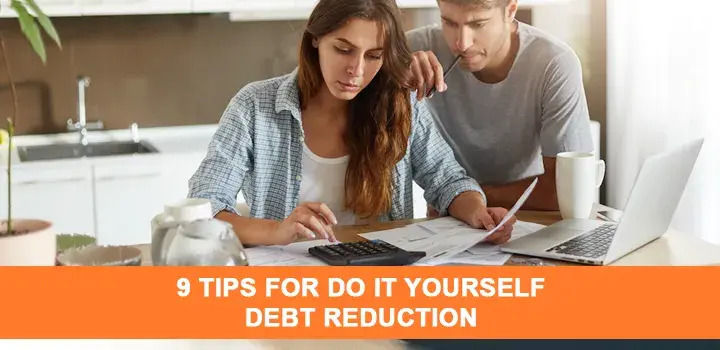9 Tips for Do-It-Yourself Debt Reduction
- Credit Repair Ease

- Jan 2, 2023
- 4 min read

Are you in the bottomless black pit of Debt Reduction and unable to climb out? You’re not alone.
Many Americans find themselves in debt every year, but on that same accord many are able to get out of debt and even improve their credit rating in the process using some of these tactics:
#1. Contact your lenders
Don’t be too prideful to ask for help. The biggest thing you can assume is that your creditors don’t care about you paying back the debt you owe. They want their money back just as much as you want to pay back your loan – and they're willing to help you, and maybe even give you some breaks in order to see you pay it off.
If you know you’re going to miss a loan or credit card payment, call your lenders and explain it to them. Many times they will understand that an emergency has popped up – you lost your job, you became ill, or you had another financial emergency that affected your ability to make a loan payment this month. If this is the first time you’ve missed a payment, chances are they will be understanding and maybe even cut you a break by reducing your interest rate because you actually called to explain your situation.
#2. Consolidate your debt
If you can consolidate, or pay off, all of your existing debts –
including your student loans, mortgage, personal loans, and credit card debt
– into a one-payment consolidated loan with a low-interest rate. There are pros and cons to debt consolidation, however, if you can consolidate your debt with a lower interest rate it may be worth it.
#3. Curb your spending and borrowing
These ones give in, but many still have trouble paying back debt because they are spending on unnecessary things they don’t need or going out and getting more credit cards and personal loans that they don’t need. My rule is to never borrow more than you know you can pay back. If you’re in financial difficulties due to multiple credit cards, do yourself a favor and cut the excess – get rid of credit cards you don’t need by paying off the balance and shutting the accounts for good. If it’s too tempting having the plastic in your cut up a few of the cards you don’t need.
#4. Budget your loan payments
Tackle your debt like you would raise money for any holiday or car – with a strict budget! Put an extra bit aside each month to pay down your loans. Start with the loans with higher interest rates and work your way down to the ones with lower interest rates.
#5. Consult a credit counselor
If you don’t have the discipline or knowledge of how to pay off your credit debt then arrange to meet with a financial advisor (credit counselor) to work out a repayment plan.
Credit counselors come in handy because they will actually negotiate with your lenders to work out a lower interest rate on your loans. They will help you budget for making regular monthly payments and offer you tactics to help you rebuild your credit rating.
For more information on How to improve your credit score read our Guide How to Improve Your Credit Score
#6. Stop spending on high-interest-rate credit cards
In fact, if you have multiple credit cards there is no reason to keep the cards with the higher interest rates. They are nothing but temptation. If you have cards with lower interest rates why wouldn’t you be putting all of your purchases on those instead of on your higher-rate credit cards?
You can also use lower-rate interest rate credit cards to your advantage by transferring the balances on high-interest-rate cards to these in order to pay off your outstanding debts at the best rate available to you. Just remember to read the fine print on your lender's agreements to make sure there is no penalty fee for transferring balances from one credit card to another.
#7. Avoid temptation when you can –
You might not believe it, but you can leave your credit card at home if you don’t anticipate needing it. Oftentimes you will be tempted to spend more because you have the option of credit in your pocket, but if you leave it at home you will be forced not to overspend and use disposable cash instead. If you know you can’t afford to pay off a credit card bill with the purchase at the end of the month you shouldn’t buy it.
#8. Reduce your credit card limits
Just because you’re offered a $3000 credit card limit, doesn’t mean you have to accept it. If you’re a person who abuses credit, it might be wise for you to call your credit card company to have them reduce your credit card limit. Remember you have control over your credit cards, and just because your credit card company raises your limit, doesn’t mean you can’t call them and tell them you don’t want it increased.
#9. Budget your monthly purchases
Curb your spending by making a budget and sticking with it. Include all of your essentials – your rent, car payment, gas, utilities, phone and internet services, laundry, hygiene items, and others. Then come up with a disposal amount of cash that you can afford to spend each month. The key is not to go overboard.
Credit Repair Ease makes it easy for people looking for the best local credit repair services provider. We are available in 51 states of the United States and are committed to offering you the best credit repair service. Whether you live in Florida, California, Texas or New York, or any other state of the United States, we help you from your location and you don’t have to take much burden.
Just Call Us To Start Now! (888) 803-7889



Comments